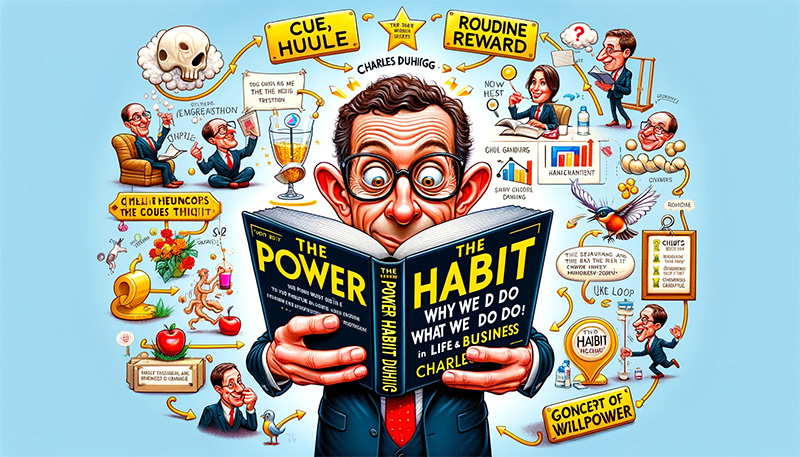
In “The Power of Habit,” Charles Duhigg, a New York Times journalist, embarks on an ambitious journey to dissect the anatomy of habits in our personal lives, corporations, and societies. At its core, the book is a foray into understanding why habits exist and how they can be transformed, a concept that Duhigg elucidates with a mix of storytelling and scientific research.
The Structure of Habits: Understanding the Mechanism
Duhigg begins by introducing the readers to the basic structure of a habit: the cue, the routine, and the reward. This simple formula, he explains, underpins every habit, forming a loop that dictates much of our behaviour. He elucidates, “A habit is a cue that triggers a routine that results in a reward.” This framework is the backbone of the book, providing a lens through which readers can examine their own habits.
The Narrative Style: A Double-Edged Sword
The book thrives on a plethora of anecdotes, ranging from individual stories of habit transformation to corporate strategies at institutions like Alcoa and Target. The narrative about how Target used predictive analytics to tailor its marketing strategies is particularly compelling, demonstrating how understanding and manipulating habits can be a powerful tool in business.
However, this storytelling approach is somewhat of a double-edged sword. On one hand, it makes the book accessible and engaging. On the other hand, the extended anecdotes can feel long-winded, diverging from the book’s core message. The narrative often borders on being too simplistic, assuming the reader’s unfamiliarity with the basic principles of psychology and behavioural science.

Practical Application: The Golden Rule of Habit Change
One of the book’s strengths lies in its practical application. Duhigg doesn’t just describe habits; he provides a blueprint for changing them. The Golden Rule of Habit Change, as he calls it, advises keeping the cue and reward but changing the routine. This is where the book transitions from being descriptive to prescriptive, offering actionable advice for those looking to change their habits.
Belief and Community: The Social Aspect of Habits
Duhigg emphasizes that for a habit to stay changed, belief in the possibility of change is crucial. He states, “For a habit to stay changed, people must believe change is possible. And most often, that belief only emerges with the help of a group.” This idea introduces the social element of habit formation and change, an aspect that enriches the book’s perspective.
The Finite Nature of Willpower: A Muscle to be Strengthened
The book delves into the concept of willpower, presenting it as a finite resource that can be depleted but also strengthened over time. Duhigg explains, “Studies show that willpower is a finite resource; it’s like a muscle that tires with use.” This concept aligns with current psychological research and provides a scientific basis for many of the book’s arguments.
A Missed Opportunity in Depth and Rigor
While “The Power of Habit” is undoubtedly informative and engaging, it misses the mark in delivering a deep, scientific exploration of habits. The book could have benefitted from a more rigorous presentation of psychological research, without the dilution of extended, tangential narratives.

Ethical Implications and Social Responsibility
A critical aspect of the book that warrants attention is its treatment of ethical implications, particularly in the context of corporate manipulation of consumer habits. While Duhigg illustrates how companies like Target use data to influence buying habits, there’s a lack of critical perspective on the ethical dimensions of such practices. This omission is a significant oversight, especially in an era where data privacy and ethical marketing are increasingly relevant topics.
A Mixed Bag Yet a Valuable Read
Finally, “The Power of Habit” is a mixed bag. It is an engaging read that simplifies complex concepts into digestible narratives, making it accessible to a broad audience. However, its oversimplification and lack of depth in certain areas might leave readers seeking more rigorous scientific analysis somewhat unfulfilled.
Duhigg’s book is a commendable effort to bring the science of habit formation to a mainstream audience. It succeeds in demystifying habits and providing practical tools for change, making it a valuable read for anyone looking to understand and transform their habits. Despite its shortcomings, “The Power of Habit” remains a significant contribution to the genre of self-help and behavioural psychology, offering insights that are applicable in both personal and professional realms.
Prof. Dr. Prahlada N. B
10 Dec 2023
Chitradurga.

















Leave a reply